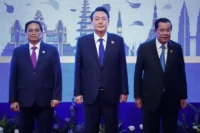
Asia’s Third Way
The defining geopolitical contest of our time is between China and the United States. And as tensions rise over trade and Taiwan, among other things, concern is understandably mounting in many capitals about a future defined by great-power competition. But one region is already charting a peaceful and prosperous path through this bipolar era. Situated at the geographical center of the U.S.-Chinese struggle for influence, Southeast Asia has not only managed to maintain good relations with Beijing and Washington, walking a diplomatic tightrope to preserve the trust and confidence of both capitals; it has also enabled China and the United States to contribute significantly to its growth and development.… Seguir leyendo »


